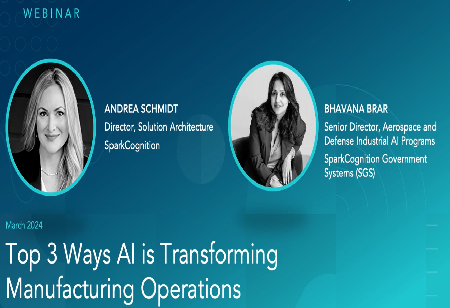
In a discussion hosted by SparkCognition, the webinar was themed on how AI is set to transform manufacturing operations. The webinar started off with an address by Andrea Omidifar, Senior Director at SparkCognition, citing the recent survey by Deloitte, where 85% of manufacturing companies think AI will make or already has made a visible impact on their organization. The market for AI in manufacturing is projected to see the largest growth year-on-year of any market and is predicted to grow at a 33% CAGR.
Bhavana Brar, Senior Director at SparkCognition Government Systems (SGS), addresses the obvious challenges in the manufacturing sector and proposes viable solutions for the problems.
The main problems in the manufacturing sector are reactive maintenance, which leads to increased downtime, equipment failures posing safety concerns and lack of data standardization.
AI can be used to monitor the early signs of potential failures. This is a huge value addition to any manufacturing firm that has critical assets that can potentially act as a bottleneck for any production schedule planned for years. AI can be used to schedule maintenance based on machine usage, production schedules, and asset criticality. It can also be used for real-time monitoring of equipment, which can give valuable data to those on the floor.
Another problem that is faced with regard to data is the excess availability of data but the lack of standards the data possesses. The data across different systems is fragmented, and it is really difficult to aggregate and gain meaningful insights from it. AI here can pre-process the data and make it more presentable. In fact, this is the primary problem any company adopting AI should face: make their data simple for the AI model to process.
The aforementioned operations are elaborated with use cases.
The first use case is leveraging the predictive maintenance capability of AI to detect the anomalous behavior of assets and provide information on the impending failure to the operators nearby. In the aerospace industry, a critical component is the autoclave, which is a sealed steel chamber made of stainless steel capable of withstanding high temperatures and pressures. It is used to manufacture components like fuselages. When systems like this fail without any critical warning, it is very costly for the company as it can throw production off-schedule and leave tons of metal to be discarded.
A common problem with maintenance or repairs faced by various industries is the subject matter expertise barrier to identifying the root cause of failure of the incoming product, addressing the issue, and addressing said problem with a suitable solution. There is also the added problem of iterations, where you have to sample the product enough times before it is ready to be released back onto the markets.
This problem can be mitigated by providing the test engineers and the technicians with suitable tools that leverage AI recommendations for repair actions for the current failures. These tools are built based on historical data of problems and solutions employed to mitigate the said problems. This will help accelerate the turnaround time for the repair operations.
There are a lot of manuals that are referenced in aerospace and other industries that are potentially decades old and pose linguistic barriers, and some are written in old, archaic English. Wrongful interpretation of all these is common. This is really hard for current-day technicians and engineers to follow. They are probably adding to the errors as they interpret it. There is also the duplication of information among the vast body of documents. This is very costly from a certification point of view. Discernment of all the right information would take time, which will mean pushing back the production schedules.
This is where LLMs are used to simplify documents and find similarities in the vast document archives. They eliminate manual browsing and quicken the process, helping remove the excess time consumed with accurate information for engineers to work with.
We use cookies to ensure you get the best experience on our website. Read more...